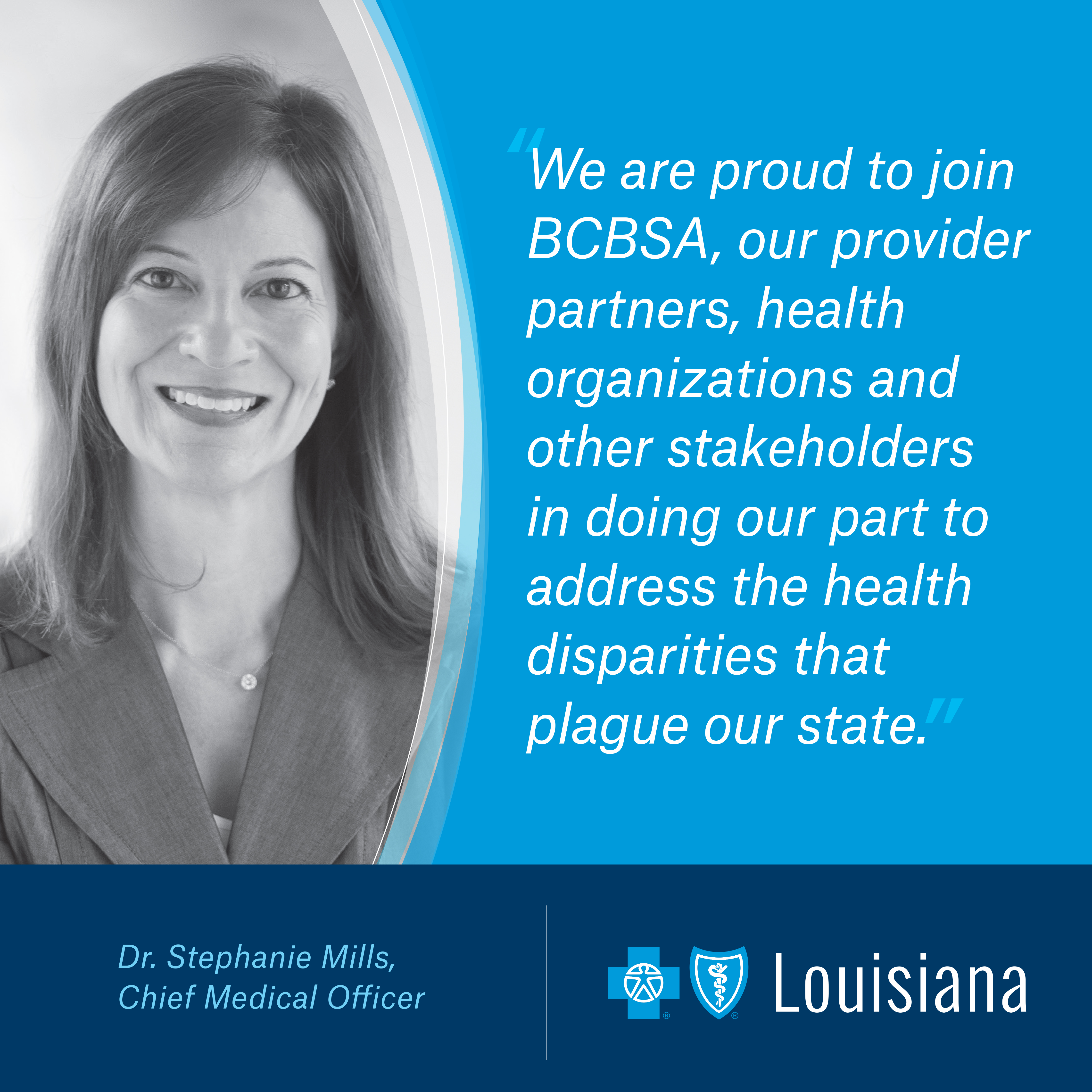
BATON ROUGE – As part of their ongoing mission to improve the health of America, Blue Cross and Blue Shield of Louisiana (Blue Cross) and the Blue Cross Blue Shield Association (BCBSA) have announced a National Health Equity Strategy to confront the nation’s crisis in racial health disparities. This strategy intends to change the trajectory of heath disparities and re-imagine a more equitable healthcare system. BCBSA has convened a national advisory panel of doctors, public health experts and community leaders to provide guidance.
“Your health shouldn’t depend on the color of your skin or the neighborhood you live in,” said Kim Keck, president and CEO of BCBSA. “The crisis in racial disparities in our country’s healthcare is unconscionable and unacceptable. While BCBS companies have made great strides in addressing racial health disparities in our local communities, there is so much more to be done.”
Keck continued, “Starting here and starting now, we can begin to put an end to the racial disparities in healthcare. Our deep roots in the local communities we serve, combined with the scale and scope of our national reach, enable all of us at Blue Cross Blue Shield companies to drive this new strategy and bring real change. But we cannot do it alone. It is a moment in time when we as a nation must come together to build a new model of equitable health care.”
Dr. Stephanie Mills, Blue Cross executive vice president – Health Services and chief medical officer, said, “Health disparities have been an unfortunate reality in Louisiana for decades, as we’ve struggled with above-average rates of diabetes, hypertension, obesity and other conditions that lessen lifespans and deprive Louisianians of a better quality of life. We rank low nationally on social determinants of health such as family poverty, exercise options and food choices available, and personal support systems, which often lead to poor health outcomes. These disparities are even more pronounced in low-income and minority communities, and that must change.
“We are proud to join BCBSA, our provider partners, health organizations and other stakeholders in doing our part to address the health disparities that plague our state,” Mills said. “This is a very meaningful way we can fulfill our mission ‘to improve the health and lives of Louisianians.’”
BCBSA’s National Health Equity Strategy is comprehensive and relies on close collaboration with providers and local community organizations. This collaboration was essential in recent months as BCBS companies worked with local leaders to support vulnerable communities with COVID-19 vaccine access. The strategy includes collecting data to measure disparities, scaling effective programs, working with providers to improve outcomes and address unconscious bias, leaning into partnerships at the community level and influencing policy decisions at the state and federal levels. The multi-year strategy will focus on four conditions that disproportionately affect communities of color: maternal health, behavioral health, diabetes and cardiovascular conditions. In 2021, BCBSA will first focus on maternal health, then behavioral health.
Setting a Goal to Address Racial Disparities in Maternal Health
BCBSA has set a public goal to reduce racial disparities in maternal health by 50% in five years.
“BCBS companies are fully committed to reach this goal,” said Keck. “We will continue to collaborate with our local partners and providers to continually improve our programs and build momentum, and we will seek out new ideas and proven initiatives that accelerate health equity reform.”
Metrics will include the U.S. Centers for Disease Control and Prevention (CDC) Severe Maternal Morbidity measures. BCBSA will report results annually. Use of nationally consistent measures will evolve over time based on research, industry development and in-market learnings.
Louisiana has higher rates of pregnancy and childbirth complications than the national average. Tonya Evans, registered nurse and manager of Population Health at Blue Cross, says there are a number of reasons for this. Evans points out that the two pregnancy complications called out in the recent Health of America Report on maternal health—preeclampsia and gestational diabetes—can be linked to some of the conditions where Louisiana ranks worst, including high blood pressure, obesity and type II diabetes.
Several of these factors likely contributed to the “F” grade the March of Dimes gave Louisiana in its 2020 Report Card. In addition to the overall “F,” the Report Card notes that the preterm birth rate among Black women in Louisiana is 55% higher than the rate among all other women.
Blue Cross has several programs to address maternal health and that of newborn babies.
Closing America’s Gap in Health Equity
The National Health Equity Strategy is part of the Blue Cross Blue Shield Pledge to Make Meaningful Change. The Pledge speaks to BCBS companies’ broad commitment to addressing racial disparity in health and all its forms. On June 2, 2020, Blue Cross and Blue Shield of Louisiana issued its own statement rejecting social injustice, including these words: “We all bear a responsibility to heal the stain of racism, including all of us at Blue Cross.”
About Blue Cross and Blue Shield of Louisiana
Blue Cross and Blue Shield of Louisiana is committed to our mission to improve the health and lives of Louisianians. Founded in New Orleans in 1934, we are a tax-paying nonprofit health insurer with offices in every major region to serve our customers. We were recognized in 2019 and 2020 as an honoree of The Civic 50, named by Points of Light as one of the 50 most community-minded companies in the United States.
Blue Cross and Blue Shield of Louisiana is an independent licensee of the Blue Cross and Blue Shield Association. We are a private mutual company, owned by our policyholders, with an independent Louisiana Board of Directors and no shareholders. We invite all Louisianians to visit our website at www.bcbsla.com or talk to us on social media.